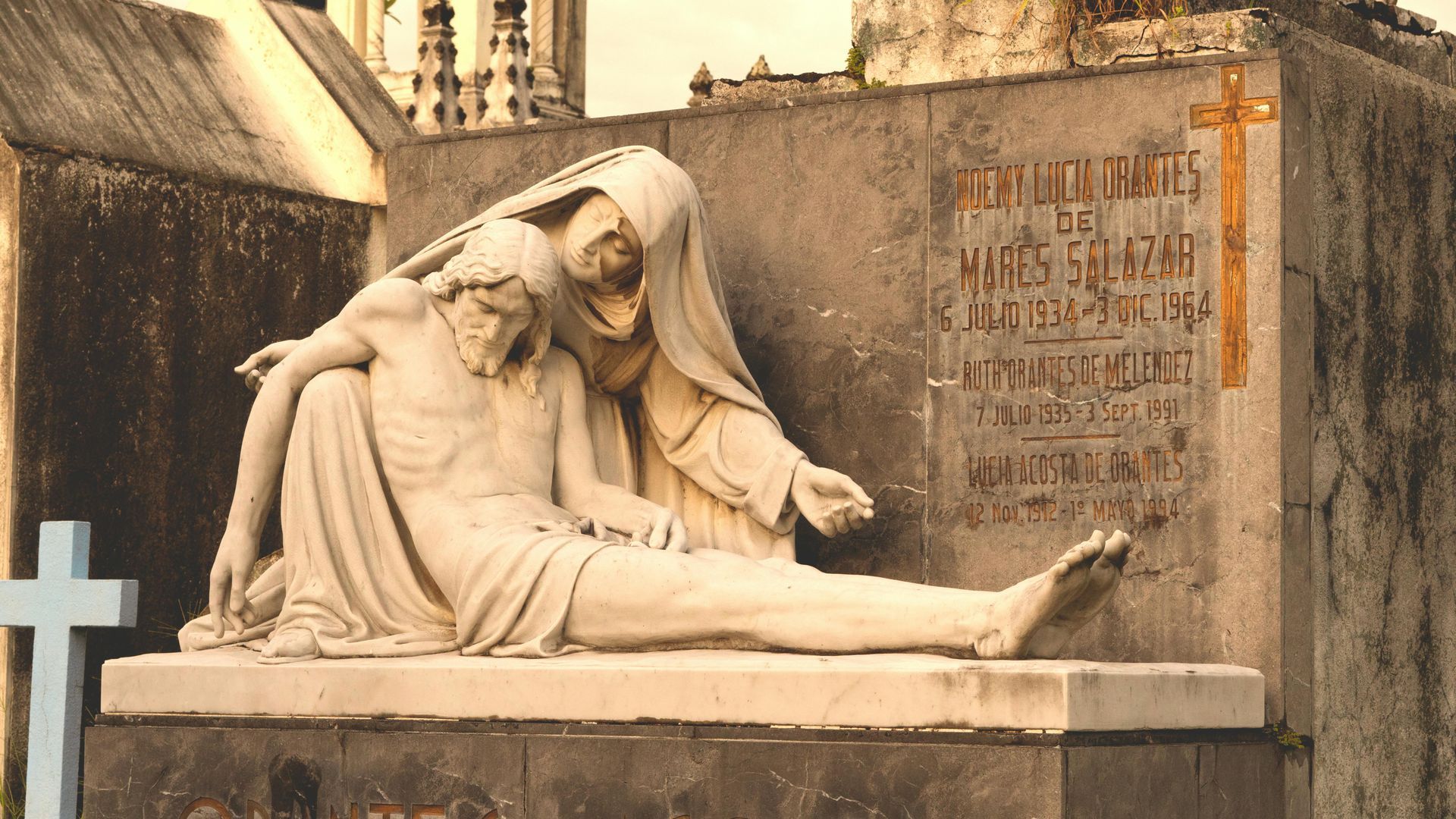
Slide title
Write your caption hereButton
Workship
Funerals
The Christian funeral is a liturgical celebration of the Church. The ministry of the Church in this instance aims at expressing efficacious communion with the deceased, at the participation in that communion of the community gathered for the funeral, and at the proclamation of eternal life to the community. CCC 1684
For information about a funeral or memorial mass please call the parish office at (847) 824-2026.
Guidance for a Catholic Funeral
Introduction
A funeral is a moment of sadness and mourning. But for Christians it is also a time of joy, because the Lord Jesus has won a great victory over death and has made it possible for us to pass into new and eternal life. This is our unshakable hope.
At a Catholic funeral we pray that our deceased brother or sister may be admitted into paradise. We also draw strength from family and friends and give our support to others in what may be a very difficult time.
If you are making final arrangements for yourself, you may feel tempted to spare your friends and relatives the pain and expense of long and elaborate funeral ceremonies. But keep in mind that they may need this opportunity to express their loss and mutual support.
If you are arranging the funeral of a family member or friend, your funeral director and your priest can help you choose the appropriate elements so that it may be a meaningful celebration of trust and hope in Jesus Christ.
Praying for the Dead
The Church has always encouraged prayer for its deceased members. This practice dates back to Old Testament times when the Maccabean brothers prayed for their fallen companions with a view to the resurrection of the body.
Since the second century, our greatest prayer, the Mass, has been offered for the repose of the souls of the dead.
Praying for our deceased brothers and sisters reflects our Christian conviction that death is not the end of our existence; it is a turning point, and prayer to our merciful God on behalf of the dead will benefit both them and us.
Our relationships with our friends and relatives do not dissolve with death. We honor them by giving their bodies a dignified Christian burial and helping them on their journey to heaven with our prayers. Once they enter the presence of God, they pray for us in return with great power.
Preparing for Death
As followers of Jesus Christ, we often recall his teaching that our true homeland is in heaven and that we are only pilgrims in this world. So we constantly prepare for our future life in heaven through the way we live as Christians now.
At the onset of illness, the priest is called and the Anointing of the Sick is celebrated to receive whatever health God may wish to restore in mind, heart, or body. When death threatens, Holy Communion may be received, called viaticum, which is food for the journey into eternal life.
Elements of the Funeral
The Catholic funeral has a number of elements that allow the Christian community to draw strength from one another and from God.
When one of its members dies, the Church prepares to offer prayers after death, in a gathering in the presence of the body, a vigil or wake, the procession to the church, the Funeral Mass or Liturgy of the Word, and the burial in the cemetery.
Meaning of the Funeral Mass
Many of the smaller elements of the Catholic funeral may be adapted or even omitted to meet the needs of the family. The Funeral Mass, however, holds a place of particular importance and should not be casually omitted.
The Eucharist is central in our spiritual life; it is also central in our celebration of Christian death. At the Last Supper, the night before he died for us, our Savior transformed bread and wine into his own Body and Blood, which he offered to his Father as a sacrifice acceptable to Him. This is the Eucharistic sacrifice he asked us to celebrate as a continuing memorial of his death and resurrection. It is a promise of future glory that sustains us throughout life and is especially meaningful when we face the death of someone dear to us.
If special considerations suggest that an alternative type of liturgy is more appropriate, a priest will be happy to discuss the details with the grieving family.
A eulogy, which does not focus on God, is better delivered at the wake and not during the Mass.
Participation
The active participation of all increases the power of our prayer, drawing us closer to God and to one another. Therefore, it is important that the music selected for the funeral be found in the books provided in the church for everyone’s use.
Catholic Burial
After the Lord Jesus gave his Spirit into the hands of his Father, his disciples carefully prepared his body according to Jewish custom and placed it in a new tomb. During the three days he was there, he sanctified the graves of all who believe in him, and by his resurrection we are restored to eternal life. As his followers, we too place the bodies or cremated remains of our brothers and sisters into the earth with the expectation that God will raise them with Christ glorified.
Our Christian burial places are blessed for the purpose of keeping the body or cremated remains until the resurrection on the last day. Therefore, such a consecrated tomb is the most fitting resting place we can give to our beloved relatives and friends.
More information about Archdiocese of Chicago/ Catholic Cemeteries

Slide title
Write your caption hereButton
The Christian funeral is a liturgical celebration of the Church. The ministry of the Church in this instance aims at expressing efficacious communion with the deceased, at the participation in that communion of the community gathered for the funeral, and at the proclamation of eternal life to the community. CCC 1684
For information about a funeral or memorial mass please call the parish office at (847) 824-2026.
Guidance for a Catholic Funeral
Introduction
A funeral is a moment of sadness and mourning. But for Christians it is also a time of joy, because the Lord Jesus has won a great victory over death and has made it possible for us to pass into new and eternal life. This is our unshakable hope.
At a Catholic funeral we pray that our deceased brother or sister may be admitted into paradise. We also draw strength from family and friends and give our support to others in what may be a very difficult time.
If you are making final arrangements for yourself, you may feel tempted to spare your friends and relatives the pain and expense of long and elaborate funeral ceremonies. But keep in mind that they may need this opportunity to express their loss and mutual support.
If you are arranging the funeral of a family member or friend, your funeral director and your priest can help you choose the appropriate elements so that it may be a meaningful celebration of trust and hope in Jesus Christ.
Praying for the Dead
The Church has always encouraged prayer for its deceased members. This practice dates back to Old Testament times when the Maccabean brothers prayed for their fallen companions with a view to the resurrection of the body.
Since the second century, our greatest prayer, the Mass, has been offered for the repose of the souls of the dead.
Praying for our deceased brothers and sisters reflects our Christian conviction that death is not the end of our existence; it is a turning point, and prayer to our merciful God on behalf of the dead will benefit both them and us.
Our relationships with our friends and relatives do not dissolve with death. We honor them by giving their bodies a dignified Christian burial and helping them on their journey to heaven with our prayers. Once they enter the presence of God, they pray for us in return with great power.
Preparing for Death
As followers of Jesus Christ, we often recall his teaching that our true homeland is in heaven and that we are only pilgrims in this world. So we constantly prepare for our future life in heaven through the way we live as Christians now.
At the onset of illness, the priest is called and the Anointing of the Sick is celebrated to receive whatever health God may wish to restore in mind, heart, or body. When death threatens, Holy Communion may be received, called viaticum, which is food for the journey into eternal life.
Elements of the Funeral
The Catholic funeral has a number of elements that allow the Christian community to draw strength from one another and from God.
When one of its members dies, the Church prepares to offer prayers after death, in a gathering in the presence of the body, a vigil or wake, the procession to the church, the Funeral Mass or Liturgy of the Word, and the burial in the cemetery.
Meaning of the Funeral Mass
Many of the smaller elements of the Catholic funeral may be adapted or even omitted to meet the needs of the family. The Funeral Mass, however, holds a place of particular importance and should not be casually omitted.
The Eucharist is central in our spiritual life; it is also central in our celebration of Christian death. At the Last Supper, the night before he died for us, our Savior transformed bread and wine into his own Body and Blood, which he offered to his Father as a sacrifice acceptable to Him. This is the Eucharistic sacrifice he asked us to celebrate as a continuing memorial of his death and resurrection. It is a promise of future glory that sustains us throughout life and is especially meaningful when we face the death of someone dear to us.
If special considerations suggest that an alternative type of liturgy is more appropriate, a priest will be happy to discuss the details with the grieving family.
A eulogy, which does not focus on God, is better delivered at the wake and not during the Mass.
Participation
The active participation of all increases the power of our prayer, drawing us closer to God and to one another. Therefore, it is important that the music selected for the funeral be found in the books provided in the church for everyone’s use.
Catholic Burial
After the Lord Jesus gave his Spirit into the hands of his Father, his disciples carefully prepared his body according to Jewish custom and placed it in a new tomb. During the three days he was there, he sanctified the graves of all who believe in him, and by his resurrection we are restored to eternal life. As his followers, we too place the bodies or cremated remains of our brothers and sisters into the earth with the expectation that God will raise them with Christ glorified.
Our Christian burial places are blessed for the purpose of keeping the body or cremated remains until the resurrection on the last day. Therefore, such a consecrated tomb is the most fitting resting place we can give to our beloved relatives and friends.
More information about Archdiocese of Chicago/ Catholic Cemeteries

